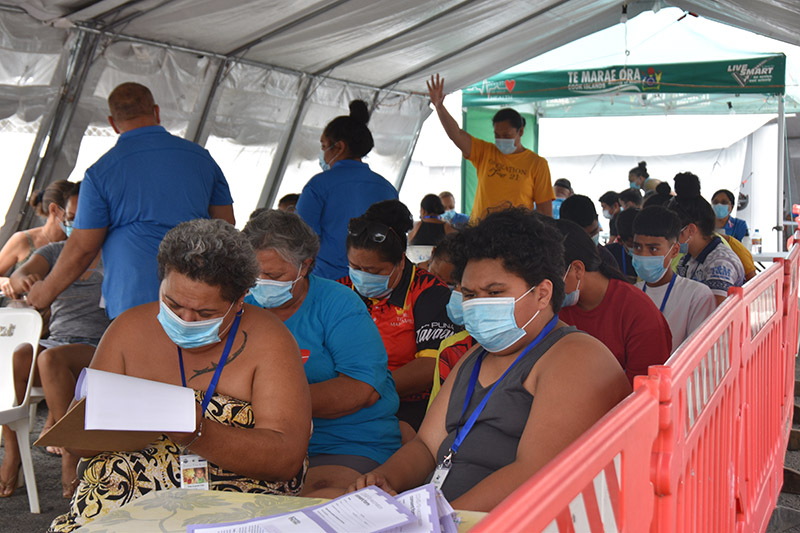Preparing our hearts and minds for Covid
Saturday 9 October 2021 | Written by Thomas Tarurongo Wynne | Published in Opinion

Even with long lines and crowded spaces, the vaccination process went smoothly for Rarotonga’s 12 to 15 year population yesterday. ALANA MUSSELLE/21100821
We must learn to live with this virus, like we do with the hurricane season, and equip and prepare our health response and our bodies, but more our hearts and minds because it is there we will truly win this battle, writes Thomas Tarurongo Wynne.
I remember the siren went off, I cleared my office as kids jumped on their bikes and quickly made their way home.
Trucks filled with students as cyclone sirens wailed across the island. And as I drove through town, giant boards went up over seafront businesses and buildings prepared to face the walls of water and sea surge, should that happen.
We were prepared, because the only thing that can save us in a disaster is our preparation for it, and especially when we know it’s coming.
A study done on hurricanes in the Cook Islands made this important statement – historical records of natural hazard impacts are an important tool for disaster preparedness.
If we can see where we have been and patterns that have developed, it helps in our preparedness for natural disasters or any disaster be they weather, political, human tragedy, or a virus that rages across the globe.
Because although we have often been missed by cyclones, we know that sadly in 1997 Cyclone Matini in Manihiki left a deadly trail, and Cyclone Pat in Aitutaki in 2010 caused extensive damage.
As a country we have never imagined that cyclones will not happen because history teaches us otherwise.
We do not imagine that locking down our island will prevent us from a hurricane reaching us; instead we have done all we can to prepare for its arrival and prepare for the destruction it may bring.
And with the hurricane that is the coronavirus, I ask what are we doing to prepare for its hitting our shores?
Imagining it won’t, and closing our country down to prevent it arriving, comes with its own costs and challenges, because eventually we must open to the world again for economic and social reasons and instead learn to live with it.
The vaccine, which for the Cook Islands has been a huge success with the delivery of vaccines for every man, woman and child made possible by the New Zealand government in July, has seen over 96 per cent of our adult population fully vaccinated. The roll out for 12 to 15 year olds has just started.
But if we think vaccination alone will deter Covid-19 from touching our shores then maybe we should consider these two very critical questions and answers from the New Zealand Covid 19 website.
Can I still get Covid-19 after I have received the vaccine? Getting two doses of the Pfizer vaccine means you are much less likely to catch Covid-19, including the Delta variant. As with any vaccine, the Pfizer vaccine may not fully protect everyone who gets it.
However, if you do catch Covid-19, the vaccine will give you a high degree of protection from serious illness. This means you could have no Covid-19 symptoms, or will have much fewer, milder symptoms, and recover faster, and something we have seen here in New Zealand with the clusters in South Auckland having so few hospitalised who were already vaccinated, and those hospitalised more often not vaccinated at all
Can you pass Covid-19 onto other people if you are vaccinated? We know it is a lot harder for the virus to spread between people who are vaccinated. To be safe, however, we must assume there is still a risk of transmission.
This is why it is important to continue taking extra safety measures, such as wearing a mask and washing your hands regularly, even after you have been vaccinated.
If we take a siege mentality to our homeland and believe that we will never encounter Covid-19 simply because we are vaccinated, then this needs to be challenged.
Yes, vaccination is a critical and key preparedness and one I completely believe we must do for ourselves, our communities and our country.
But let us not then think that all is done because we are vaccinated because preparedness must also involve pouring more resources, money, human resources and health expertise than we have ever done before if we are to open the borders again to the world.
Like a hurricane or cyclone, we cannot prevent its arrival, but what we can do is prepare for its waves to hit our shores and protect our people.
Ask the nearly 360 people who endured a lockdown last year what that feels like, and the 350 who are about to join them with the first 90 home from Christchurch now isolating at the Edgewater Resort.
We must learn to live with this virus, like we do with the hurricane season, and equip and prepare our health response and our bodies, but more our hearts and minds because it is there we will truly win this battle.
Covid answers: https://covid19.govt.nz/covid-19-vaccines/get-the-facts-about-covid-19-vaccination/covid-19-vaccination-your-questions-answered/















































Comments
STEVE SEIPOLT on 11/10/2021
I think if the Cook Island government sat down properly and thought more they could open now and been opened weeks ago. - Vaccinated only visitors - Pre-departure COVID screening - 7 day COVID monitoring - Restrict flights to 1-2 a week If the population is vaccinated and ready to make their lives normal again, open the door why not.
Lou S on 09/10/2021
Do you think it's likely Cook Islands might open to Australia before NZ?